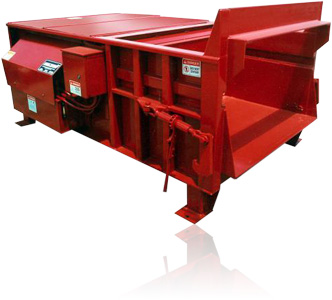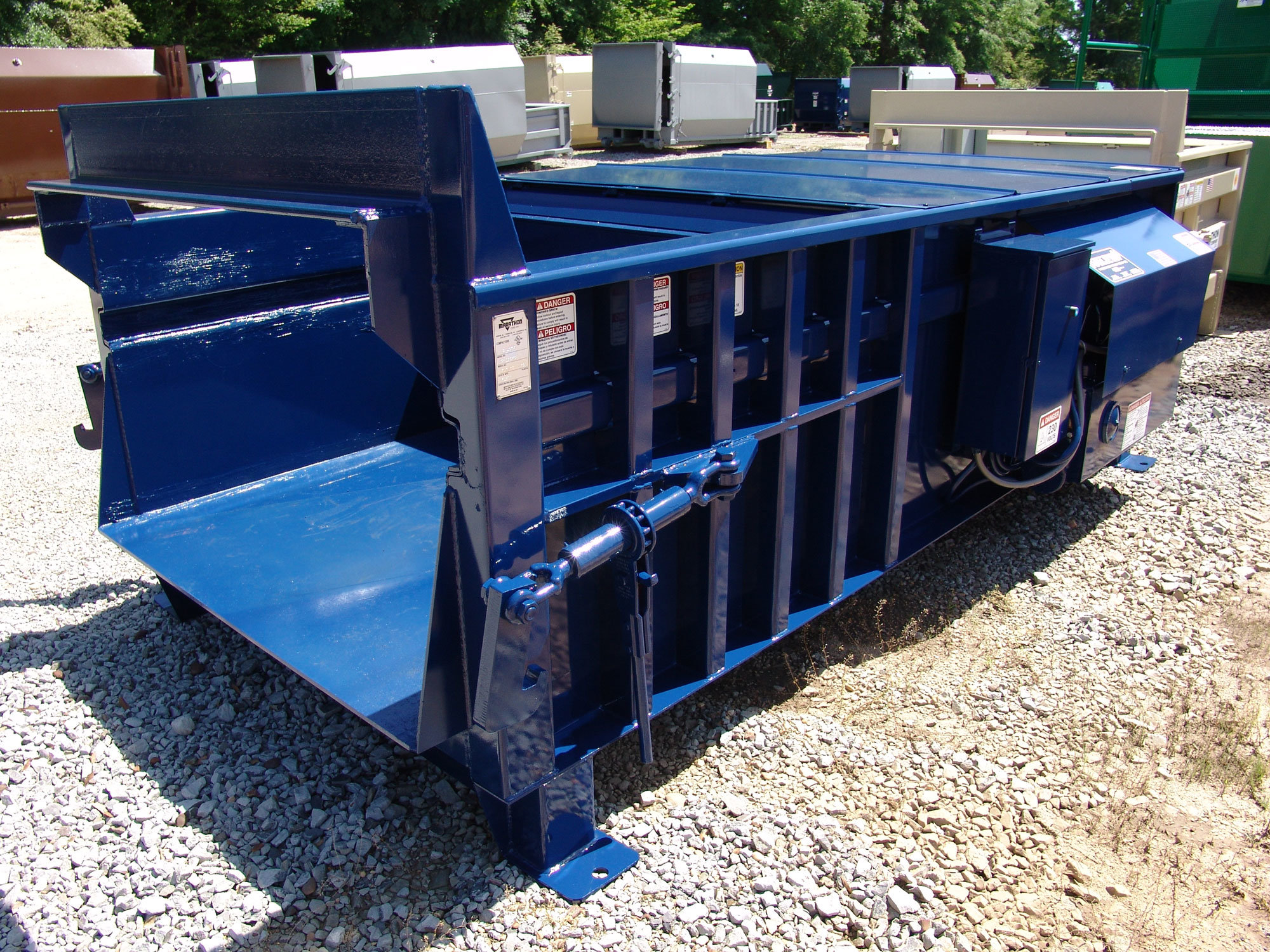Commercial trash compaction equipment and its role in lowering waste volume
Wiki Article
How Waste Equipment Improves Performance in Garbage Compactor Procedures
Waste Equipment plays an important function in enhancing the effectiveness of garbage compactor procedures. By employing advanced sensing units and automation, these systems boost compaction cycles and check lots abilities properly. This assimilation not only conserves power yet additionally lowers pick-up regularity and linked expenses. As organizations increasingly take on these technologies, the implications for functional sustainability and monitoring methods become clearer. What various other benefits might emerge from these innovations in waste Equipment?The Duty of Advanced Sensors in Compaction Effectiveness
Advanced sensing units play a vital role in boosting the performance of trash compactors. These innovative tools keep track of numerous parameters, consisting of load capacity, wetness degrees, and compaction cycles, permitting real-time modifications. By properly gauging the amount of waste, sensing units allow compactors to maximize their procedure, guaranteeing that energy intake is lessened while optimizing the volume of waste refined.Advanced sensing units contribute to predictive upkeep by identifying potential concerns before they lead to Equipment failing. This proactive technique not only minimizes downtime but also prolongs the life-span of the compactor. On top of that, information accumulated from these sensing units can be examined to boost operational techniques, bring about improved waste administration practices. On the whole, the integration of sophisticated sensors in garbage disposal significantly enhances their efficiency and operational effectiveness, converting into cost financial savings and an extra sustainable method to lose disposal.
Resilience and Design: Materials That Matter
The longevity and design of garbage disposal hinge considerably on the materials used in their construction. Top notch steel is commonly the primary choice, giving stamina and resistance to tear and wear. This robust product withstands the enormous pressure applied during compaction, making sure longevity and integrity. In addition, elements such as hydraulic systems are generally crafted from corrosion-resistant alloys to avoid destruction over time, boosting functional effectiveness.Style also plays an important function in functionality; ergonomic shapes and strategic supports can substantially affect performance. Manufacturers typically focus on modular styles, allowing for simpler upkeep and fixings. Developments in coating technologies, such as powder finishing, boost resistance to environmental factors, consisting of moisture and chemicals. Inevitably, the careful option of materials not just improves the architectural stability of garbage compactor however additionally adds to their total effectiveness and performance in waste administration operations.
Automation and Smart Innovation in Waste Equipment

Automated compactors can optimize compaction cycles based on the volume of waste, taking full advantage of space and boosting operational efficiency. Assimilation with mobile applications allows customers to keep an eye on and manage compactors from remote places, boosting comfort and responsiveness. By adopting these modern technologies, waste management firms can not only boost their functional process but additionally contribute to even more sustainable techniques by decreasing waste and optimizing source usage. On the whole, automation and clever technology represent a substantial jump forward in the efficiency of garbage compactor operations.
Information Analytics for Optimizing Waste Administration
Harnessing data analytics supplies waste monitoring companies an effective device for optimizing operations and boosting effectiveness. By accumulating and assessing information from numerous resources, such as compactor performance metrics and waste generation patterns, companies can acquire useful insights. These insights enable them to make informed decisions relating to collection timetables, compactor use, and upkeep requirements.Furthermore, predictive analytics can anticipate waste generation patterns, allowing business to designate sources a lot more properly and avoid prospective overflows or underutilizations of Equipment. Real-time surveillance via data analytics also enhances the capability to respond swiftly to functional obstacles, lowering downtime and boosting service reliability.
Furthermore, integrating data analytics with existing waste management systems cultivates a society of constant renovation. By recognizing ineffectiveness and tracking performance over time, companies can improve their procedures and embrace best techniques, inevitably causing a much more reliable and lasting waste management approach.
Price Cost Savings Through Enhanced Functional Effectiveness
By lessening and enhancing operations waste, firms can accomplish considerable cost financial savings in their waste administration processes. Improved operational performance in garbage compactor reduces the regularity of pickups, causing lower transport prices. Additionally, progressed waste Equipment permits optimum compaction, making best use of container capability and minimizing the requirement for added bins.This enhanced performance not only reduces garbage disposal charges yet also prolongs the life-span of Equipment, decreasing maintenance prices. Automated monitoring systems supply real-time information, enabling for positive adjustments in waste handling, which can additionally boost efficiency and lessen unintended expenses.
Furthermore, robust training programs for personnel on Equipment usage can bring about boosted functional practices, even more driving down prices. Eventually, the assimilation of effective waste Equipment Commercial trash compaction equipment promotes a cost-effective waste monitoring strategy that benefits companies economically while making certain smoother operations.
Ecological Influence: A Sustainable Strategy to Waste Monitoring

Carrying out reusing efforts along with compaction procedures allows companies to divert materials from garbage dumps, advertising round economy principles. Services that take on eco pleasant techniques not just boost their company responsibility but likewise attract increasingly eco-conscious consumers. By prioritizing sustainability in waste management, organizations can achieve a dual advantage: improving operational efficiency while proactively adding to ecological preservation. This balanced approach positions companies as leaders in sustainable methods, cultivating a much healthier earth for future generations.
Often Asked Inquiries
Exactly How Often Should Waste Equipment Be Kept for Ideal Performance?
The regularity of upkeep for waste Equipment normally depends upon usage and producer recommendations - Industrial waste compaction equipment. Generally, assessments ought to occur quarterly, with comprehensive maintenance annually to ensure peak efficiency and protect against potential break downs or ineffectivenessWhat Kinds Of Waste Can Be Refined in Trash Compactors?
Garbage compactors can refine various kinds of waste, consisting of cardboard, paper, plastics, and non-hazardous food waste. Users need to avoid condensing dangerous products, metals, and fluids to ensure reliable and risk-free procedure.Are There Safety And Security Functions in Modern Garbage Compactors?
Modern trash compactors often include safety and security functions such as automated shut-off systems, emergency stop switches, and sensing unit systems (Industrial waste compaction equipment). These enhancements are made to safeguard customers from potential threats throughout operation, advertising a more secure working settingHow Does Waste Equipment Influence Labor Requirements?
The influence of waste Equipment on labor demands is substantial; it usually lowers the demand for manual work, streamlining processes and improving performance. As a result, fewer workers are needed, permitting organizations to assign resources more effectively.What Is the Typical Life Expectancy of a Trash Compactor?
The ordinary life expectancy of a garbage disposal typically ranges in between 10 to 15 years, depending upon use, upkeep, and ecological variables. Normal maintenance can expand this life-span, ensuring excellent efficiency and integrity throughout its functional years.By adopting these technologies, waste management companies can not just boost their operational process but also add to more sustainable techniques by decreasing waste and optimizing resource use. By enhancing operations and minimizing waste, firms can achieve substantial price financial savings in their waste monitoring procedures. Lasting waste administration approaches, particularly in garbage compactor operations, contribute considerably to minimizing landfill waste and lowering carbon footprints. Modern waste Equipment is created to optimize compaction, consequently decreasing the quantity of waste requiring disposal. Trash compactors can process different kinds of waste, consisting of cardboard, paper, plastics, and non-hazardous food waste.
Report this wiki page